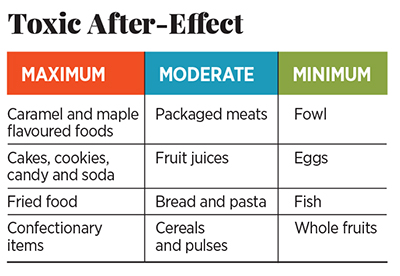
Ageing gracefully isn't difficult
Subtle changes in diet and keeping evil carbohydrates at bay can take good care of our skin, organs and blood vessels

Image: Shutterstock
Diet plays a crucial role in not only keeping us in shape but also improving our health and well-being. While micronutrients (vitamins, minerals and phytonutrients) are important to support metabolism, the intake of macronutrients (carbohydrates, proteins and fats) is equally essential for ageing gracefully. The constituents and composition of macronutrients in our diet play a vital role in controlling the ageing of the skin, skeletal tissues, organs and blood vessels.
The intake of macronutrients has a unique influence on our metabolic pathways, which determine if we end up feeling lethargic or energetic hours after we eat. At the cellular level, the mitochondria prefers fats as a fuel source to generate energy. However, in the presence of high blood sugar after a meal, the mitochondria prioritises glucose for energy production before shifting back to fats as its primary source of fuel.

Since 1980s, AGEs are directly related to accelerated ageing. High blood sugar level in the body results in “glycation”, an initial step in AGE formation. AGEs are formed when a sugar molecule attaches to a protein molecule without the benefit of an enzyme to dictate the reaction. The role of enzymes is to regulate chemical reactions and to ensure the reactions are conforming to an intricately regulated metabolic programme. Hence the absence of an enzyme when sugar molecule attaches to protein molecule is hazardous.
In the absence of an enzyme, the sugar attaches to a protein haphazardly and presents the stage for unregulated and unintended chemical reactions. AGEs accumulate in the retina, cornea and lens of the eyes where they appear to cause opacity and browning of the lens categorised by senile cataracts.
AGEs also accumulate in nerve endings, membranes of the kidney, lining of the arteries and the skin collagen among other tissues and organs, making them less functional, stiff and less elastic, causing accelerated ageing. They also play a critical role in causing heart disease. The trickiest characteristic about AGEs is that their formation takes years before they inflict their negative effects. However, their production can be controlled through our food choices. By making subtle changes in our diet and reducing the intake of evil carbohydrates as a staple macronutrient, we can keep AGEs under control.
The writer is founder and CEO of 48 Fitness.
(This story appears in the 09 November, 2018 issue of Forbes India. To visit our Archives, click here.)
Post Your Comment















